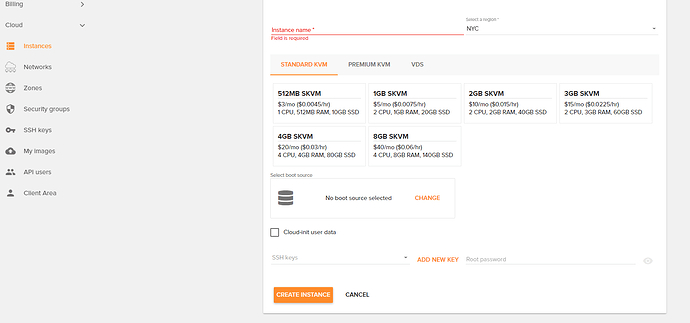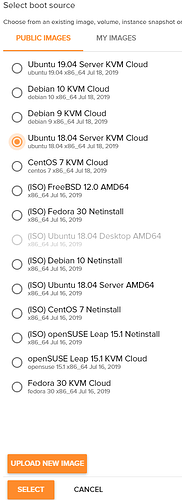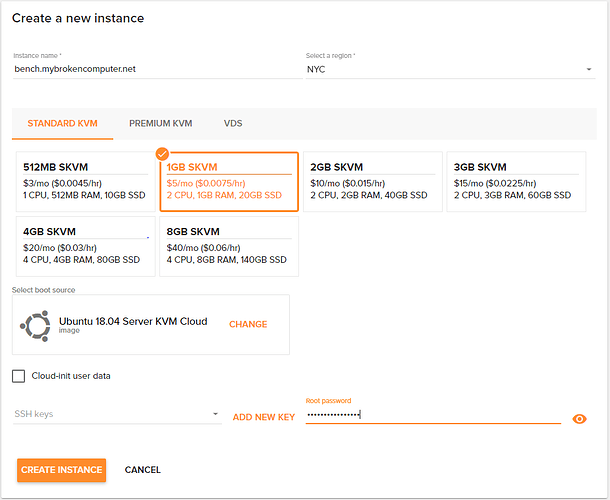Today Ramnode released the long awaited OpenStack management platform.
Here is the official announcement.
We are excited to announce that our OpenStack Cloud is now available! You can sign up through our newly redesigned website, add at least $3 in Cloud Credit , and log into the Cloud Control Panel to launch a new instance!
KVM is available in all US locations, with NL expected next week.
What’s New?
There are several new features available through the Cloud Control Panel:
- Image / ISO uploads
- Snapshots / backups
- Cloud-config with cloud-init user-data
- Private networking
- Security groups
- OpenStack API
In addition to these features, cloud services are billed hourly with the option to prepay for cloud credit or pay for what you use with a credit card on file. Hourly prices are listed on our website, as well as the prices for image storage and bandwidth overages.
Known Issues
The new panel has a few known issues that we are working to fix soon. We will update this article as we go. Please contact us via support ticket if you spot something else.
What’s Next?
We plan to offer the following options/features at some point in the next few months:
- Container plans
- Kubernetes
- Object storage
We intended to launch LXC alongside KVM, but the driver we were working with was unfortunately retired. We are re-evaluating our container options (LXC, OpenVZ, etc.) with the goal of being able to offer something ASAP.
Existing VPS
Existing VPSs are not directly impacted by the launch of our new cloud service. You do not have to make any changes regarding your current VPSs. Your service will continue as it is. We have disabled new orders on SolusVM, but our SolusVM host nodes will run alongside OpenStack indefinitely.
We indicated a while back that existing VPSs would be migrated to OpenStack; however, after spending a lot of time on it, we decided to leave things in place to avoid massive headaches for everyone. Migrations would have involved unpredictable amounts of downtime, a variety of networking problems, billing issues for old coupons/annual payments, etc. We also determined that several popular OpenVZ features would not directly translate to LXC. You are of course welcome to create new cloud instances to replace your existing VPSs, but the systems and services are completely separate.
On a related note, we do have a few things in the works for existing VPSs. We will be migrating our OpenVZ nodes to OpenVZ 7 starting in the next month or so. We are also working on an emergency backup system that will allow you to restore VPS data upon request.
Other Notes
- Cloud instances come with 1 IPv6 address. You can open a ticket for more.
- The monthly price is the same between SolusVM and Cloud KVM plans, with cloud plans being billed hourly. Plan specs are identical other than IPv6 assignment.
- Cloud plans have a different naming convention than SolusVM plans:
- SKVM (Cloud) = SKVMS (SolusVM) - not to be confused with our retired SKVM-E3 plans
- PKVM (Cloud) = NKVM (SolusVM)
- VDS (Cloud) = SVDS (SolusVM)
We will be updating our Knowledgebase to reflect these changes over the next few days. We realize documentation on the new system is lacking and plan to add more ASAP.
As always, we welcome your feedback! Feel free to contact us via support ticket or our IRC channel.
This has been a long, long time in the works. The folks over at Ramnode first shared screenshots of the panel way back in March o f 2019 in this tweet
So, what does all this mean for us, the consumers of the Ramnode services? Well, let’s kick the tires and see how it performs.
Insert squealing brakes here. There does not seem to be a way to actually order the product. After logging into WHMCS as a registered customer, I can add “Cloud” to the shopping cart, but there is nothing available to actually order.
After clicking on order now, we are brought to the checkout screen, with what appears to be a zero dollar item.

It was not until I placed the zero dollar order that I got an email from Ramnode with the URL to the cloud control panel. For those who don’t want to go through the same hassle as me, here is the direct URL.
I suspect as this is a whole new backend, that this was the reason for needing to create a zero dollar order. I had some Ramnode credit in my account, however when I logged into the cloud control panel, none of my credit was available to me. GRR. I logged a ticket with the Ramnode billing department at 5:14pm local time, and they responded with the solution at 5:15. One minute response time. Here is what they suggested which worked. Not intuitive, but it worked.
Hello,
You can just create an add cloud credit invoice from our cloud panel or client area and pay the invoice in WHMCS from your available balance.
So - onto what we came here for, let’s create a VPS and benchmark the environment.
The first thing I needed to to was to create an instance, choose my size, location, type and give it a name.
I chose Ubuntu 18.04, Ubuntu and the NYC datacenter.
Here is how things looked once I had selected all of the options for my instance.
For benchmark purposes, we are working with 2vCPU and GB RAM backed up by a 20GB SSD. Let the benchmarks begin!
Let’s first start with bench.sh
Benchmark 1. I actually hat to CTRL+C this one, as it seemed to hang when doing an IPV6 network speed test to an overseas location. Not a big deal, as most users will still be relying on IPv4.
CPU model : AMD EPYC Processor (with IBPB)
Number of cores : 2
CPU frequency : 2099.998 MHz
Total size of Disk : 20.1 GB (1.2 GB Used)
Total amount of Mem : 985 MB (96 MB Used)
Total amount of Swap : 0 MB (0 MB Used)
System uptime : 0 days, 0 hour 3 min
Load average : 0.03, 0.09, 0.04
OS : Ubuntu 18.04.2 LTS
Arch : x86_64 (64 Bit)
Kernel : 4.15.0-54-genericI/O speed(1st run) : 965 MB/s
I/O speed(2nd run) : 943 MB/s
I/O speed(3rd run) : 1.0 GB/s
Average I/O speed : 977.3 MB/sNode Name IPv4 address Download Speed
CacheFly 205.234.175.175 109MB/s
Linode, Tokyo, JP 106.187.96.148 13.9MB/s
Linode, Singapore, SG 139.162.23.4 5.85MB/s
Linode, London, UK 176.58.107.39 18.3MB/s
Linode, Frankfurt, DE 139.162.130.8 25.3MB/s
Linode, Fremont, CA 50.116.14.9 16.0MB/s
Softlayer, Dallas, TX 173.192.68.18 33.4MB/s
Softlayer, Seattle, WA 67.228.112.250 19.7MB/s
Softlayer, Frankfurt, DE 159.122.69.4 16.3MB/s
Softlayer, Singapore, SG 119.81.28.170 6.91MB/s
Softlayer, HongKong, CN 119.81.130.170 7.18MB/sNode Name IPv6 address Download Speed
Linode, Atlanta, GA 2600:3c02::4b 85.3MB/s
Linode, Dallas, TX 2600:3c00::4b 20.9MB/s
Linode, Newark, NJ 2600:3c03::4b 105MB/s
Linode, Singapore, SG 2400:8901::4b 5.28MB/s
Linode, Tokyo, JP 2400:8900::4b 9.83MB/s
Softlayer, San Jose, CA 2607:f0d0:2601:2a::4 19.9MB/s
Second run of the suite once again got hung on an IPv6 speedtest.
CPU model : AMD EPYC Processor (with IBPB)
Number of cores : 2
CPU frequency : 2099.998 MHz
Total size of Disk : 20.1 GB (1.8 GB Used)
Total amount of Mem : 985 MB (99 MB Used)
Total amount of Swap : 0 MB (0 MB Used)
System uptime : 0 days, 0 hour 28 min
Load average : 1.23, 0.78, 0.45
OS : Ubuntu 18.04.2 LTS
Arch : x86_64 (64 Bit)
Kernel : 4.15.0-54-genericI/O speed(1st run) : 1.1 GB/s
I/O speed(2nd run) : 1.0 GB/s
I/O speed(3rd run) : 918 MB/s
Average I/O speed : 1022.8 MB/sNode Name IPv4 address Download Speed
CacheFly 205.234.175.175 41.7MB/s
Linode, Tokyo, JP 106.187.96.148 14.1MB/s
Linode, Singapore, SG 139.162.23.4 6.32MB/s
Linode, London, UK 176.58.107.39 20.6MB/s
Linode, Frankfurt, DE 139.162.130.8 25.8MB/s
Linode, Fremont, CA 50.116.14.9 20.6MB/s
Softlayer, Dallas, TX 173.192.68.18 35.1MB/s
Softlayer, Seattle, WA 67.228.112.250 19.2MB/s
Softlayer, Frankfurt, DE 159.122.69.4 17.1MB/s
Softlayer, Singapore, SG 119.81.28.170 6.52MB/s
Softlayer, HongKong, CN 119.81.130.170 7.40MB/sNode Name IPv6 address Download Speed
Linode, Atlanta, GA 2600:3c02::4b 79.1MB/s
Linode, Dallas, TX 2600:3c00::4b 19.6MB/s
Linode, Newark, NJ 2600:3c03::4b 104MB/s
Linode, Singapore, SG 2400:8901::4b 4.40MB/s
Linode, Tokyo, JP 2400:8900::4b 10.6MB/s
Softlayer, San Jose, CA 2607:f0d0:2601:2a::4 20.2MB/s
Let’s do one more for good measure.
CPU model : AMD EPYC Processor (with IBPB)
Number of cores : 2
CPU frequency : 2099.998 MHz
Total size of Disk : 20.1 GB (1.8 GB Used)
Total amount of Mem : 985 MB (99 MB Used)
Total amount of Swap : 0 MB (0 MB Used)
System uptime : 0 days, 0 hour 31 min
Load average : 0.14, 0.50, 0.40
OS : Ubuntu 18.04.2 LTS
Arch : x86_64 (64 Bit)
Kernel : 4.15.0-54-genericI/O speed(1st run) : 1.0 GB/s
I/O speed(2nd run) : 1.0 GB/s
I/O speed(3rd run) : 887 MB/s
Average I/O speed : 978.3 MB/sNode Name IPv4 address Download Speed
CacheFly 205.234.175.175 110MB/s
Linode, Tokyo, JP 106.187.96.148 13.2MB/s
Linode, Singapore, SG 139.162.23.4 6.75MB/s
Linode, London, UK 176.58.107.39 16.4MB/s
Linode, Frankfurt, DE 139.162.130.8 26.5MB/s
Linode, Fremont, CA 50.116.14.9 17.0MB/s
Softlayer, Dallas, TX 173.192.68.18 37.7MB/s
Softlayer, Seattle, WA 67.228.112.250 19.8MB/s
Softlayer, Frankfurt, DE 159.122.69.4 16.1MB/s
Softlayer, Singapore, SG 119.81.28.170 6.85MB/s
Softlayer, HongKong, CN 119.81.130.170 7.87MB/sNode Name IPv6 address Download Speed
Linode, Atlanta, GA 2600:3c02::4b 75.9MB/s
Linode, Dallas, TX 2600:3c00::4b 44.7MB/s
Linode, Newark, NJ 2600:3c03::4b 105MB/s
Linode, Singapore, SG 2400:8901::4b 5.97MB/s
Linode, Tokyo, JP 2400:8900::4b 10.7MB/s
Softlayer, San Jose, CA 2607:f0d0:2601:2a::4 19.7MB/s
This is the first VPS that I have benchmarked that is now using AMD EPYC processors. The disk IO speed is insane for a shared node, however we need to keep in mind that this is day one of the Ramnode Openstack deployment, so I am sure that I am one of the only users on this particular node. Also of note for the bench.sh benchmark, is that IPV6 is enabled by default - this is a good thing. What is not so great is the IPV6 performance between the Ramnode NYC datacenter and the
The clock speed of the EPYC CPU is slow, but that should not really be an issue. Let’s let Geekbench decide how well it performs. So onwards!
Single-Core Score Multi-Core Score 3090 4994 Geekbench 4.3.3 Tryout for Linux x86 (64-bit) Result Information
Upload Date July 18 2019 09:44 PM Views 1 System Information
System Information Operating System Ubuntu 18.04.2 LTS 4.15.0-54-generic x86_64 Model OpenStack Foundation OpenStack Nova Motherboard N/A Memory 985 MB BIOS SeaBIOS 1.10.2-1ubuntu1
Processor Information Name AMD EPYC (with IBPB) Topology 2 Processors, 2 Cores Identifier AuthenticAMD Family 23 Model 1 Stepping 2 Base Frequency 2.10 GHz L1 Instruction Cache 64.0 KB x 1 L1 Data Cache 64.0 KB x 1 L2 Cache 512 KB x 1 L3 Cache 16.0 MB x 1 Single-Core Performance
Single-Core Score 3090 Crypto Score 3575 Integer Score 3112 Floating Point Score 2838 Memory Score 3296 AES 3575 2.69 GB/sec LZMA 2871 4.49 MB/sec JPEG 3332 26.8 Mpixels/sec Canny 3318 46.0 Mpixels/sec Lua 2401 2.47 MB/sec Dijkstra 3757 2.54 MTE/sec SQLite 2905 80.5 Krows/sec HTML5 Parse 2789 12.7 MB/sec HTML5 DOM 2918 2.64 MElements/sec Histogram Equalization 2472 77.2 Mpixels/sec PDF Rendering 3341 88.8 Mpixels/sec LLVM 5018 345.1 functions/sec Camera 2946 8.17 images/sec SGEMM 1558 33.0 Gflops SFFT 2572 6.41 Gflops N-Body Physics 2772 2.07 Mpairs/sec Ray Tracing 2456 358.7 Kpixels/sec Rigid Body Physics 3500 10246.7 FPS HDR 4179 15.2 Mpixels/sec Gaussian Blur 3631 63.6 Mpixels/sec Speech Recognition 2856 24.4 Words/sec Face Detection 2891 844.6 Ksubwindows/sec Memory Copy 2659 7.37 GB/sec Memory Latency 3709 116.7 ns Memory Bandwidth 3631 19.4 GB/sec Multi-Core Performance
Multi-Core Score 4994 Crypto Score 6674 Integer Score 5717 Floating Point Score 5095 Memory Score 2793 AES 6674 5.03 GB/sec LZMA 4931 7.70 MB/sec JPEG 6339 51.0 Mpixels/sec Canny 5434 75.4 Mpixels/sec Lua 4527 4.65 MB/sec Dijkstra 5913 4.00 MTE/sec SQLite 5353 148.4 Krows/sec HTML5 Parse 5201 23.6 MB/sec HTML5 DOM 5653 5.12 MElements/sec Histogram Equalization 4810 150.3 Mpixels/sec PDF Rendering 6216 165.2 Mpixels/sec LLVM 9841 676.7 functions/sec Camera 5799 16.1 images/sec SGEMM 2898 61.3 Gflops SFFT 3918 9.77 Gflops N-Body Physics 5388 4.02 Mpairs/sec Ray Tracing 3524 514.7 Kpixels/sec Rigid Body Physics 6280 18385.3 FPS HDR 7707 27.9 Mpixels/sec Gaussian Blur 6992 122.5 Mpixels/sec Speech Recognition 5233 44.8 Words/sec Face Detection 6063 1.77 Msubwindows/sec Memory Copy 3338 9.25 GB/sec Memory Latency 1791 241.7 ns Memory Bandwidth 3647 19.5 GB/sec
Round TWO! BENCH!
Single-Core Score Multi-Core Score 2991 5123 Geekbench 4.3.3 Tryout for Linux x86 (64-bit) Result Information
Upload Date July 18 2019 09:48 PM Views 1 System Information
System Information Operating System Ubuntu 18.04.2 LTS 4.15.0-54-generic x86_64 Model OpenStack Foundation OpenStack Nova Motherboard N/A Memory 985 MB BIOS SeaBIOS 1.10.2-1ubuntu1
Processor Information Name AMD EPYC (with IBPB) Topology 2 Processors, 2 Cores Identifier AuthenticAMD Family 23 Model 1 Stepping 2 Base Frequency 2.10 GHz L1 Instruction Cache 64.0 KB x 1 L1 Data Cache 64.0 KB x 1 L2 Cache 512 KB x 1 L3 Cache 16.0 MB x 1 Single-Core Performance
Single-Core Score 2991 Crypto Score 3588 Integer Score 3009 Floating Point Score 2926 Memory Score 2898 AES 3588 2.70 GB/sec LZMA 2787 4.35 MB/sec JPEG 3196 25.7 Mpixels/sec Canny 3181 44.1 Mpixels/sec Lua 2312 2.38 MB/sec Dijkstra 3406 2.31 MTE/sec SQLite 2681 74.4 Krows/sec HTML5 Parse 2593 11.8 MB/sec HTML5 DOM 2947 2.67 MElements/sec Histogram Equalization 2485 77.7 Mpixels/sec PDF Rendering 3315 88.1 Mpixels/sec LLVM 5003 344.0 functions/sec Camera 2934 8.14 images/sec SGEMM 1571 33.2 Gflops SFFT 2255 5.62 Gflops N-Body Physics 3135 2.34 Mpairs/sec Ray Tracing 2703 394.7 Kpixels/sec Rigid Body Physics 3489 10214.9 FPS HDR 4335 15.7 Mpixels/sec Gaussian Blur 4033 70.7 Mpixels/sec Speech Recognition 2973 25.4 Words/sec Face Detection 2893 845.2 Ksubwindows/sec Memory Copy 2565 7.11 GB/sec Memory Latency 2891 149.8 ns Memory Bandwidth 3284 17.5 GB/sec Multi-Core Performance
Multi-Core Score 5123 Crypto Score 6748 Integer Score 5835 Floating Point Score 5215 Memory Score 2975 AES 6748 5.08 GB/sec LZMA 5111 7.98 MB/sec JPEG 6439 51.8 Mpixels/sec Canny 6052 83.9 Mpixels/sec Lua 4649 4.78 MB/sec Dijkstra 5674 3.84 MTE/sec SQLite 5398 149.7 Krows/sec HTML5 Parse 5211 23.7 MB/sec HTML5 DOM 5699 5.16 MElements/sec Histogram Equalization 4724 147.6 Mpixels/sec PDF Rendering 6572 174.6 Mpixels/sec LLVM 10056 691.4 functions/sec Camera 5936 16.5 images/sec SGEMM 3041 64.3 Gflops SFFT 4377 10.9 Gflops N-Body Physics 4945 3.69 Mpairs/sec Ray Tracing 3723 543.7 Kpixels/sec Rigid Body Physics 6473 18950.5 FPS HDR 7587 27.5 Mpixels/sec Gaussian Blur 7472 130.9 Mpixels/sec Speech Recognition 5479 46.9 Words/sec Face Detection 5800 1.69 Msubwindows/sec Memory Copy 3912 10.8 GB/sec Memory Latency 1773 244.2 ns Memory Bandwidth 3799 20.3 GB/sec
Final round of benchmarking from Geekbench coming up.
Single-Core Score Multi-Core Score 2971 5161 Geekbench 4.3.3 Tryout for Linux x86 (64-bit) Result Information
Upload Date July 18 2019 09:52 PM Views 1 System Information
System Information Operating System Ubuntu 18.04.2 LTS 4.15.0-54-generic x86_64 Model OpenStack Foundation OpenStack Nova Motherboard N/A Memory 985 MB BIOS SeaBIOS 1.10.2-1ubuntu1
Processor Information Name AMD EPYC (with IBPB) Topology 2 Processors, 2 Cores Identifier AuthenticAMD Family 23 Model 1 Stepping 2 Base Frequency 2.10 GHz L1 Instruction Cache 64.0 KB x 1 L1 Data Cache 64.0 KB x 1 L2 Cache 512 KB x 1 L3 Cache 16.0 MB x 1 Single-Core Performance
Single-Core Score 2971 Crypto Score 3709 Integer Score 2943 Floating Point Score 2652 Memory Score 3328 AES 3709 2.79 GB/sec LZMA 2532 3.96 MB/sec JPEG 3099 24.9 Mpixels/sec Canny 2909 40.3 Mpixels/sec Lua 2302 2.37 MB/sec Dijkstra 3294 2.23 MTE/sec SQLite 2673 74.1 Krows/sec HTML5 Parse 2604 11.8 MB/sec HTML5 DOM 2953 2.68 MElements/sec Histogram Equalization 2470 77.2 Mpixels/sec PDF Rendering 3284 87.3 Mpixels/sec LLVM 4984 342.7 functions/sec Camera 2938 8.15 images/sec SGEMM 1538 32.5 Gflops SFFT 2029 5.06 Gflops N-Body Physics 2350 1.76 Mpairs/sec Ray Tracing 2544 371.5 Kpixels/sec Rigid Body Physics 3466 10147.0 FPS HDR 3882 14.1 Mpixels/sec Gaussian Blur 3432 60.1 Mpixels/sec Speech Recognition 2891 24.7 Words/sec Face Detection 2612 763.1 Ksubwindows/sec Memory Copy 2565 7.11 GB/sec Memory Latency 4531 95.5 ns Memory Bandwidth 3174 17.0 GB/sec Multi-Core Performance
Multi-Core Score 5161 Crypto Score 6458 Integer Score 5795 Floating Point Score 5298 Memory Score 3203 AES 6458 4.86 GB/sec LZMA 5134 8.02 MB/sec JPEG 6320 50.9 Mpixels/sec Canny 5680 78.8 Mpixels/sec Lua 4595 4.72 MB/sec Dijkstra 6270 4.24 MTE/sec SQLite 5351 148.3 Krows/sec HTML5 Parse 5241 23.8 MB/sec HTML5 DOM 5550 5.03 MElements/sec Histogram Equalization 4964 155.1 Mpixels/sec PDF Rendering 6260 166.3 Mpixels/sec LLVM 9805 674.2 functions/sec Camera 5702 15.8 images/sec SGEMM 3087 65.3 Gflops SFFT 4271 10.6 Gflops N-Body Physics 5968 4.46 Mpairs/sec Ray Tracing 3967 579.3 Kpixels/sec Rigid Body Physics 6199 18148.5 FPS HDR 7613 27.6 Mpixels/sec Gaussian Blur 6871 120.4 Mpixels/sec Speech Recognition 5301 45.4 Words/sec Face Detection 6135 1.79 Msubwindows/sec Memory Copy 3922 10.9 GB/sec Memory Latency 1737 249.2 ns Memory Bandwidth 4824 25.8 GB/sec
For those of you interested in raw network performance, we have the speedtest-cli benchmarks next. Here are three of them taken at random times today.

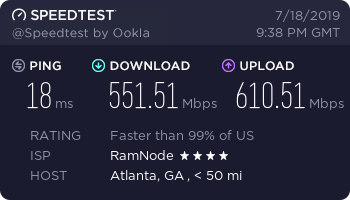
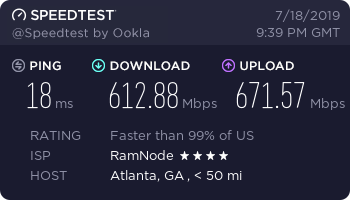
Not the best networking performance that I have seen from a VPS, but it certainly serviceable.
To conclude - there is nothing earth shattering about the new Ramnode offering from a performance perspective, however what do you get now on the Openstack platform makes it worth a second look.
- Image / ISO uploads
- Snapshots / backups
- Cloud-config with cloud-init user-data
- Private networking
- Security groups
- OpenStack API
I for one have been bugging Ramnode for while to implement private networking, and it is now here! All of the openstack features, plus what I believe to be some of the best support in the industry makes it pretty compelling compared to the the other players in this pay per hour space. (looking at you Digital Ocean and Vultr).

